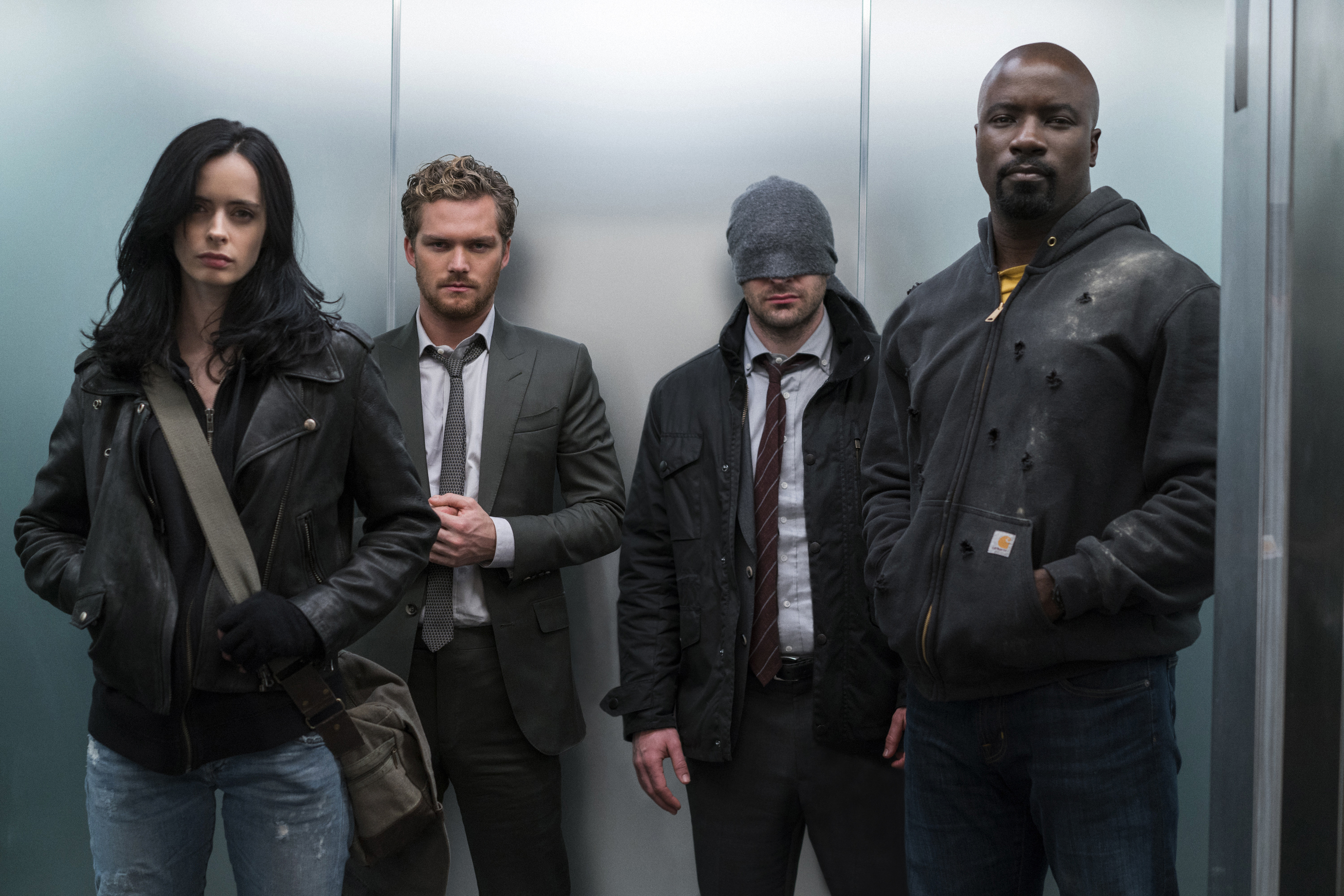The Defenders blessedly abandons the super-hero backstory
This is the best of Netflix's Marvel shows so far, and the way it just dives right into its story is how all genre TV should be


A free daily email with the biggest news stories of the day – and the best features from TheWeek.com
You are now subscribed
Your newsletter sign-up was successful
In the opening minutes of Netflix's new miniseries The Defenders, we find out what the heroes of the other Marvel Universe shows have been up to lately. The blind lawyer with incredible agility and enhanced senses, Matt "Daredevil" Murdock, has ditched his vigilante guise and is back to fighting for the disadvantaged in a courtroom. The invulnerable Luke Cage is out of prison, having atoned for past crimes. The ever-cynical and super-strong Jessica Jones is running her more-successful-than-ever private eye business, and still numbing her pain with booze. And mystical warrior Danny "Iron Fist" Rand is busy uncovering the imminent threat of a nefarious martial arts organization known as The Hand.
The first episode's script doesn't explain too much about who these people are or what adventures they've had in the past. The Defenders pretty much assumes that viewers will have watched all those other Marvel seasons, in full.
But let me propose something that some may find hard to believe. You don't need to have seen any of Daredevil, Jessica Jones, Luke Cage, or Iron Fist to enjoy The Defenders — nor do you have to know anything about the original Marvel super-team comic that gave the series its name. I'll go even further: The Defenders is the best of Netflix's Marvel shows so far, and the way it just dives right into its story is how all genre TV should be.
The Week
Escape your echo chamber. Get the facts behind the news, plus analysis from multiple perspectives.

Sign up for The Week's Free Newsletters
From our morning news briefing to a weekly Good News Newsletter, get the best of The Week delivered directly to your inbox.
From our morning news briefing to a weekly Good News Newsletter, get the best of The Week delivered directly to your inbox.
"Prestige television" has a "season-bloat" problem. The sophistication and experimentation that premium cable and subscription services allow should be freeing up writers, directors, and producers to rethink what a "TV episode" or "TV season" means. But in practice, creators have largely stuck to the old narrative structures — with episodes that run 30 minutes or an hour, and seasons that run 10 or 13 episodes — while making what they claim are extended length "movies," telling one long story.
Vulture's Kathryn VanArendonk took aim at this trend back in March, in her essay "Why Are We So Sure 'Prestige' TV Looks Like a 10-Hour Movie?" and her even more cutting listicle "13 Signs You're Watching a 'Prestige' TV Show." Uproxx's Alan Sepinwall has been beating the drum against "it's like a novel for television" or "it's like a 10-hour movie" for a while now, in essays arguing in favor of episodes that tell their own stories. Recently, Sepinwall warned that shows which take forever to get to the point are at risk of being abandoned after an episode or two. In response to that, The New York Times' James Poniewozik suggested something akin to what I'm saying regarding The Defenders: that if you hear a show doesn't "get good" until episode six, then start watching with episode six.
I don't mean to imply that Netflix's other Marvel efforts aren't worthwhile. Daredevil combines the grounded realism of police procedurals and legal dramas with action sequences that rival the best of martial arts movies. Jessica Jones is a hard-boiled, noir-inflected private-eye show that doubles as an intimate character study of a troubled young woman. Luke Cage takes the tough-guy posturing and "defending the defenseless" premises of black cinema classics like Shaft and Foxy Brown and updates them for the hip-hop era. All of them work the characters' various superpowers casually into the story, making them feel more natural and less fantastical. Iron Fist is the only one of the bunch that's a real dud.
Still, I have to admit that watching the first season of Daredevil back in the spring of 2015 was when I really began to recognize how much the inclination toward slowness and seriousness in modern television had become insidious. Whenever the characters on Daredevil weren't fighting, they were sitting inertly in darkened rooms, quietly muttering about how unhappy they were. Every dialogue scene lasted twice as long as it needed to, and was marred by a general lack of energy and enthusiasm.
A free daily email with the biggest news stories of the day – and the best features from TheWeek.com
Netflix only made the first four of The Defenders' eight episodes available to critics, but the miniseries' more accelerated tempo is obvious from episode one, which bounces from character to character while establishing the story and the stakes. By the end of the hour, we know where each of the heroes and their various friends and allies are at in their lives, and we've met this corner of the Marvel Universe's intriguing new villain, Alexandra (played by Sigourney Weaver), a stealthy New York power broker going through a personal crisis.
By the end of the first episode, a cataclysmic event affects all the principals, reminding viewers that the characters occupy a lot of the same space in New York. By the end of episode two, their paths begin to cross, as Luke meets and tussles with Danny, and Matt helps Jessica out of legal trouble.
Then episode three ends with one of the most thrilling sequences in the entire run of Netflix's Marvel shows, as one by one all four superheroes show up in Alexandra's elegantly furnished, well-lit boardroom, where they fight side-by-side against a seemingly unceasing wave of trained mercenaries. The imagery's clean and modern, the action's frenetic, and it's a real treat to see each character's unique fighting style, side-by-side.
The Defenders shares most of the virtues of the other Marvel TV programs. The characters are well-drawn and well-acted (including sidekicks and colleagues like Misty Knight, Colleen Wing, Claire Temple, Foggy Nelson, and "Stick"). The location shooting is frequently stunning, with kinetic camera moves and deep frames capturing the look and feel of a major metropolis. And the willingness to give scenes time and space to develop leads to some remarkable sequences — like the extended prologue of episode three, where Alexandra brings one of Daredevil's old enemies back into the game.
The variety of personalities also adds a dynamism that's sometimes lacking from these characters' individual series. The well-earned skepticism of Jessica and Luke deflates some of the self-seriousness of Matt and Danny. (Just the way the other three look at Daredevil when he says, "I can hear neon" makes this team-up worthwhile.) And because The Defenders retains a lot of the texture and tone of its feeder-shows, there's a refreshing variety to the episodes from scene to scene — unlike the often dreary sameness of a Daredevil, Jessica Jones, Luke Cage, or Iron Fist season.
That said, anyone who wants to diagnose the problem with prestige TV can find plenty of fodder in The Defenders. The show still sports scenes that run too long for no real reason — such as a montage of Jessica Jones doing research in episode two that amounts to several minutes of her opening drawers, with barely any useful information provided to the audience during the bulk of the sequence.
And episode four disappointingly reverts to modern TV's "better tap the brakes before we accidentally entertain" mentality. On the heels of the battle royale that ends episode three, the four heroes hunker down in a Chinese restaurant, where they reluctantly share information and bicker, doing whatever they can to avoid becoming the team that gives The Defenders its name.
Too much of television these days attempts to "elevate" genre fare by keeping the fun stuff to a minimum. In The Defenders, Jessica even complains in episode one that she doesn't want her friend to "say the h-word" — meaning she has no intention of embracing super-heroics. In the place of action and feats of wonder, shows like Netflix's Marvel collection inject long pauses, to give the characters time to consider whether they really want to advance to the next part of the story.
Taking a moment to breathe and reflect can be a hallmark of strong storytelling. A good example of this is Game of Thrones, which this season has been bringing characters back together who haven't shared scenes in years, and has taken the time to let the meaning of their reunions soak in. The difference is that not long after the more emotional beats, Game of Thrones accelerates to huge battles, with fire-breathing dragons. The writers jump straight into the next set of crises, rather than deferring them until later.
Given that The Defenders only runs for eight episodes, I don't expect much more wheel-spinning going forward. Or at least I hope not. If these four heroes don't fight alongside each other again until the finale, that'll be a major letdown.
In fact, if the last four episodes of The Defenders are as good and to-the-point as the first three, here's hoping that Netflix and the creators who produce this kind of television will learn that we don't need to watch 13 hours of a hero very slowly and reluctantly springing into action to find their story "believable" or "involving." We don't even need much in the way of backstory or context — because we've all watched TV, seen movies, and read books before.
Here's all a show like The Defenders needs to do: Just let us know that these four people all have superpowers, and they fight against evil. Then, show them doing just that. We can keep up.
Noel Murray is a freelance writer, living in Arkansas with his wife and two kids. He was one of the co-founders of the late, lamented movie/culture website The Dissolve, and his articles about film, TV, music, and comics currently appear regularly in The A.V. Club, Rolling Stone, Vulture, The Los Angeles Times, and The New York Times.
-
 Corruption: The spy sheikh and the president
Corruption: The spy sheikh and the presidentFeature Trump is at the center of another scandal
-
 Putin’s shadow war
Putin’s shadow warFeature The Kremlin is waging a campaign of sabotage and subversion against Ukraine’s allies in the West
-
 Media: Why did Bezos gut ‘The Washington Post’?
Media: Why did Bezos gut ‘The Washington Post’?Feature Possibilities include to curry favor with Trump or to try to end financial losses
-
 Walter Isaacson's 'Elon Musk' can 'scarcely contain its subject'
Walter Isaacson's 'Elon Musk' can 'scarcely contain its subject'The latest biography on the elusive tech mogul is causing a stir among critics
-
 Welcome to the new TheWeek.com!
Welcome to the new TheWeek.com!The Explainer Please allow us to reintroduce ourselves
-
 The Oscars finale was a heartless disaster
The Oscars finale was a heartless disasterThe Explainer A calculated attempt at emotional manipulation goes very wrong
-
 Most awkward awards show ever?
Most awkward awards show ever?The Explainer The best, worst, and most shocking moments from a chaotic Golden Globes
-
 The possible silver lining to the Warner Bros. deal
The possible silver lining to the Warner Bros. dealThe Explainer Could what's terrible for theaters be good for creators?
-
 Jeffrey Wright is the new 'narrator voice'
Jeffrey Wright is the new 'narrator voice'The Explainer Move over, Sam Elliott and Morgan Freeman
-
 This week's literary events are the biggest award shows of 2020
This week's literary events are the biggest award shows of 2020feature So long, Oscar. Hello, Booker.
-
 What She Dies Tomorrow can teach us about our unshakable obsession with mortality
What She Dies Tomorrow can teach us about our unshakable obsession with mortalityThe Explainer This film isn't about the pandemic. But it can help viewers confront their fears about death.
